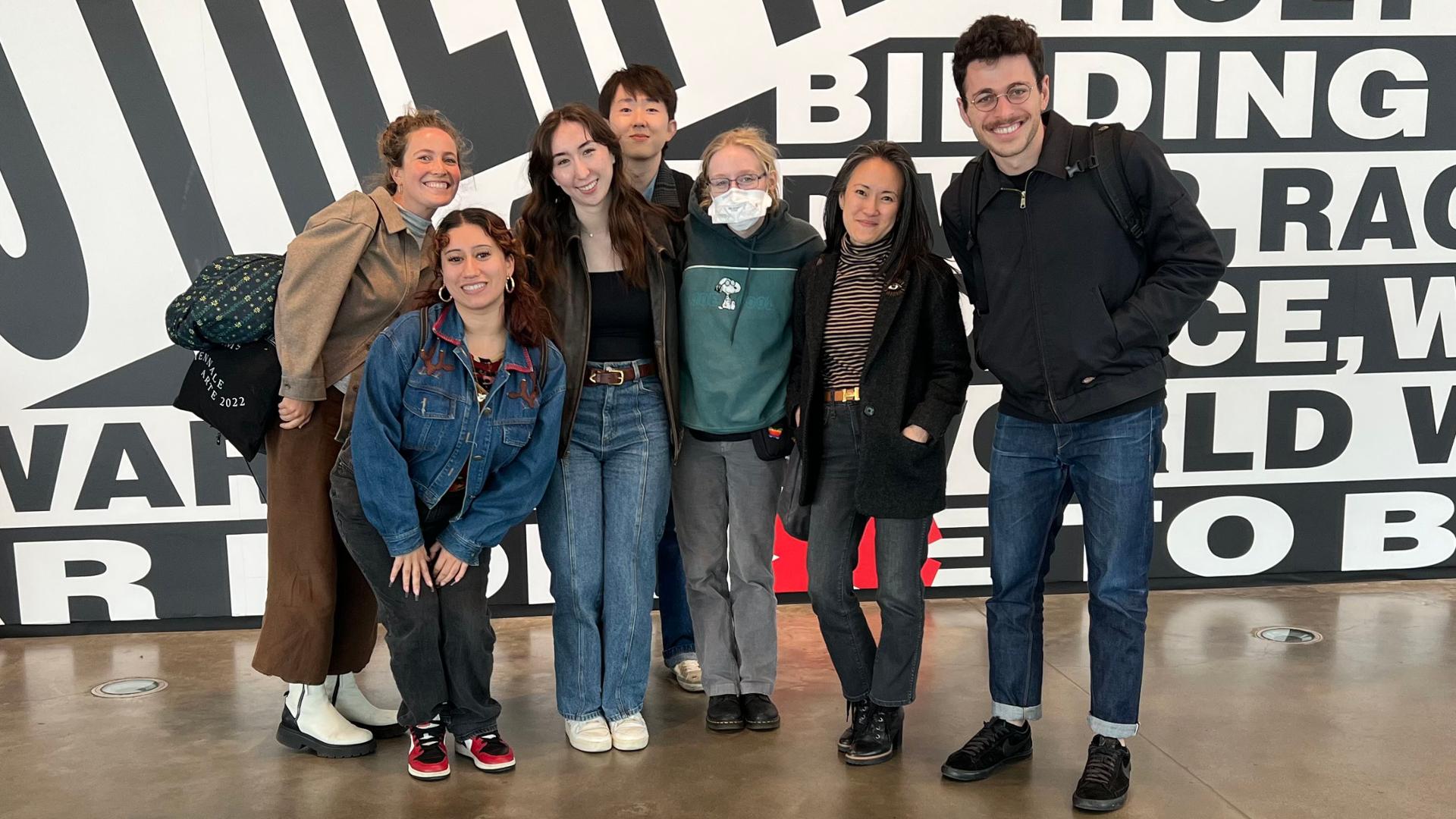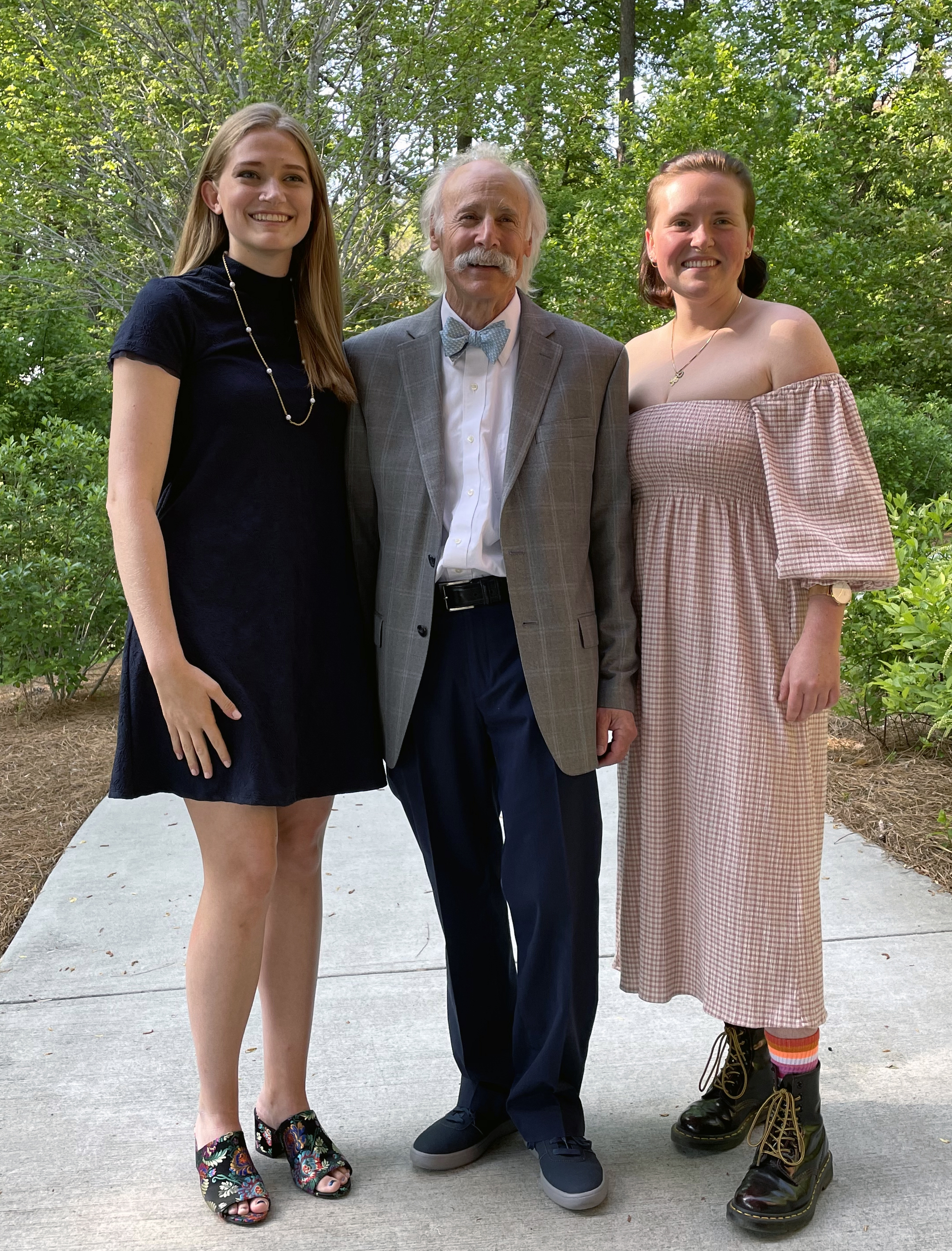
Research Opportunities
Honors Program in Art History
Students admitted to the Honors Program in Art History write a substantial thesis under the direction of a faculty member. In addition, they participate in occasional writing workshops, take a graduate-level course, and present their topics to faculty and peers in a mid-year symposium. General requirements for admission to the program conform to ECAS guidelines.
Please click here for the Honors Program application.
The Marc Ernstoff Prize in Art History
 The Marc Ernstoff Prize in Art History supports undergraduate learning opportunities that foster connections between the visual arts and the sciences. Students may apply for funds to support such activities as summer work on excavations or in conservation labs; internship support; architectural training; or travel to exhibitions, museums, libraries, and archives to conduct research related to an independent study project or honors thesis. The prize is intended to enhance a liberal arts education through experiences that reveal how studying art and architecture helps one understand the natural world and how science and art impact one another.
The Marc Ernstoff Prize in Art History supports undergraduate learning opportunities that foster connections between the visual arts and the sciences. Students may apply for funds to support such activities as summer work on excavations or in conservation labs; internship support; architectural training; or travel to exhibitions, museums, libraries, and archives to conduct research related to an independent study project or honors thesis. The prize is intended to enhance a liberal arts education through experiences that reveal how studying art and architecture helps one understand the natural world and how science and art impact one another.
Eligibility: Art History majors and minors, History/Art History majors, and Architectural Studies minors, at any stage in their academic careers.
How to Apply
Submit the following to Laurie Carter at laurie.carter@emory.edu:
- A statement (300-500 words) specifying exactly how you would use the funding, and how that experience would enhance your training in art history.
- A detailed budget.
In addition, an Emory University Art History faculty member should send a letter of endorsement directly to Laurie Carter.
What is the deadline?
April 5, 2024
What is awarded?
Up to $2000
For More Information:
Thanks to Dr. Ernstoff's generosity, we were able to award two Ernstoff prizes again this year!
Margaret Greene, a graduating senior majoring in Art History and graduating with High Honors, will use her Ernstoff funds to travel to the island of Samothrace to participate in the 2023 Excavations in the Sanctuary of the Great Gods under the direction of Professor Bonna Wescoat. Greene will begin a PhD program in Egyptology at Brown University in the fall of 2023.
Caitlin Burns, a graduating senior majoring in Art History with a minor in Architectural Studies, will use her award to attend the Career Discovery Program at the Harvard Graduate School of Design, exploring the field to craft a path for herself in architecture.
Congratulations to Margaret and Caitlin!
*Because we have not been able to award the prize for the past two years, we are giving two prizes this year to support two exemplary projects.
One prize goes to Elise Williams, who recently completed a thesis titled “The Artwork of Tragedy: Roman Children’s Funerary Altars with Portraits and their Functions,” which was awarded Highest Honors in Art History. By studying photographs and written descriptions, Elise was able to catalog 45 ancient Roman altars, documenting their iconography and inscriptions; the Ernstoff Prize will allow her to continue her research this summer by visiting the altars in person—seeing for herself the objects she has known only through imperfect images and descriptions. Many are in museums, but she also plans to visit at least some of their find spots to better understand how the altars, as originally placed, may have interacted with the landscape and even engaged with passersby. Ultimately, she hopes to pursue this topic in a PhD program, continuing to build on the foundation she established at Emory.
The second prize goes to Isabelle Bracewell, who will design and construct a native-wood table for the atrium of the Math and Science Center. Her project was conceived in the spirit of the Arts & Crafts Movement, which she has researched this year as part of a Directed Study that culminated in a paper titled “Renovating the Interior: A Queer Reading of the Social History of the Arts and Crafts and Aesthetic Movements in Victorian England.” The project also draws on the experience she has gained as an intern with the Physics Department, creating an exhibition of antique scientific instruments; and with the Atlanta Beltline, exploring public engagement with physical materials in both architectural and natural spaces. Her hope is to create a beautiful, lasting, and environmentally responsible monument where students in the arts and sciences can gather and converse.
Dorothy Fletcher Paper Prize
The Dorothy Fletcher Paper Prize is awarded annually to an outstanding research paper in the history of art.
Who can compete?
Undergraduates of any year, in any major.
What kind of paper is eligible?
Research papers of approximately 10 pages, with citations and a bibliography, written for an art history course in the spring or fall semester of 2023.
How do I go about entering a paper into the competition?
Please send a copy of your paper and the completed cover sheet as email attachments to Dr. Linda Merrill, who will submit it to the prize committee. Click here to download a fillable cover sheet.
What is the deadline?
Friday, March 8, 2024, at midnight.
What is awarded?
A small monetary prize—and, if the winner is a senior, recognition in the Commencement Program.
For more information, contact:
Dr. Linda Merrill, Director of Undergraduate Studies for Art History.
Winners
First Prize
Harrison Helms for "Domenico Lenzi's Specchio Umano as a Public Exemplum: Grain Merchants, Charity, and Florentine Identity," written for Jean Campbell's Art in the Age of Dante
Grace Regnier for "Alexandrian Necropoliin Conversation with the Living," written for Andrew Farinholt Ward's The Ancient City
Second Prize
Fanting (Kacey) Gu for "A Traditional Chinese Garden or a Twenty-first Century Park?" written for Todd Cronan's Methodolog in Art History Research
First Prize
Meera Sood for "Strictly Religious? An Exploration of Ancient Greek Sacrificial Practices," written for Andrew Ward's Ancient Greek Sanctuaries
Second Prize
Caitlin Burns for "Constructing Community: From the Theoretical Foundations of EPCOT to the Built Environment of Celebration," written for Christina Crawford's The Architect + the City
Zimra Chickering for "The Imagined Jew: Hyenas, Owls, and the Mutable Imagery of the Religious 'Other,'" written for Elizabeth Pastan's Medieval Bestiary
Honorable Mention
Andee Koo for "Contrasting the Motivations of Green Suburbs: Riverside and Levittown," written for Christina Crawford's The Architect + the City
First Prize
Nick Pehrson for "Greenbelt, Maryland, as an Experiment in Socialism," written for Christina Crawford's The Architect + the City
Daniel Meek for "Revisiting Winslow Homer's Guardian Dyad," written for Linda Merrill's Winslow Homer in Context
2020
First Place: Victoria Gu
Second Place: Shayna Gutridge
Third Place: Rizky Etika
2019
Shared First Place: Olivia Chang and Parth Goyal
2018
First Place: Adam Ring
Honorable Mention: Cecily Spindel
2017
First Place: Ekaterina Koposova
Honorable Mention: Darby Caso
2016
Shared First Place: Madeline Drace and Jenifer Norwalk
2015
First Place: Yujun Yan
Second Place: Hannah Rose Blakeley
2014
Shared First Place: Margaret Gregg and Daniel J. Majarwitz
2013
First Place: Caitlin Ryan
Second Place: Peter Boudreau
2012
First Place: Erin Dunn
Second Place: Rebecca Levitan
Honorable Mention: Wu Rui
2011
First Place: Rebecca Pedersen
2010
Shared First Place: Jen Levy and Marie-Helene Gagnon
2009
First Place: Jen Levy
Second Place: Laura Daly
2008
First Place: Joanna Levine
Second Place: Laura Michelson
2007
First Place: Anne-Marie Gann
2006
Shared First Place: Emily Bacher and Nicole Cridland
2005
First Place: Peter Clericuzio
Second Place: Joshua Backer
2004
Shared First Place: Peter Clericuzio and Plamena Milusheva
2003
First Place: Tim Adams
Second Place: Scott Walter
The Blavatnik Fund for Experiential Learning
The Blavatnik Fund for Experiential Learning was established to expand and enhance learning and research opportunities for undergraduate students. Eligible students may apply for funding that can be used for a variety of experiences, from local events to larger travel.
Eligibility
Art History majors and minors, History/Art History majors, and Architectural Studies minors, at any stage in their academic careers.
How to apply
Submit the following to Laurie Carter at laurie.carter@emory.edu:
A statement (300–500 words) specifying exactly how you would use the funding, and
how that experience would enhance your training in art history.
A detailed budget.
In addition, an Emory University Art History faculty member should send a letter of endorsement directly to Laurie Carter.
What is the deadline?
Students may apply at any time during the academic year.
What is awarded?
Up to $2000
For more information
Contact Dr. Linda Merrill, Director of Undergraduate Studies for Art History lmerri2@emory.edu, Carlos Hall 135
Thanks to the generosity of the Blavatnik family, twelve students will be able to participate in various experiential learning experiences this summer. Funds were awarded to the following students:
Audra Buffington (24C), Art History Major
Summer 2023 travel to Sicily
Jada Chambers (23C), Art History Major
Attending the Summer 2023 Emory Art History Study Abroad program in Rome
Alyssa Colen (25C), Architectural Studies Minor
Attending the Career Discovery Program at Harvard Graduate School of Design, summer 2023
Julia Danko (24C), Art History Minor
Attending the Career Discovery Program at Harvard Graduate School of Design, summer 2023
Elise Etrheim (23C), Art History Minor
MFA Pathways Object Conservation Pre-program Internship at the Museum of Fine Arts Boston, summer 2023
Elena Ghitan (23C), Architectural Studies Minor
Attending the 2023 season of the American Excavations on Samothrace
Kacey Gu (24C), Art History Major
Conducting research for her senior honors thesis on the Wu School of paintings in Suzhou, China
Eleanor Ma (24C), Art History Major
Conducting research for her senior honors thesis on the feminist art collective, the Guerrilla Girls
Hattie Poston (24C), Art History Major
Attending the 2023 season of the Argilos, Greece Field School
Lonnie Reid (24C), Art History Major
Attending the 2023 season of the American Excavations on Samothrace
Aviva Wright (26C), Architectural Studies Minor
Attending the Career Discovery Program at Harvard Graduate School of Design, summer 2023
Robin Yang (23C), Architectural Studies Minor
Attending the Summer Institute in Environmental Design at UC Berkeley
Internships
There are many opportunities for Art History students to gain hands-on experience working in their areas of interest. Below are links to the internship requirements and lists of museums and galleries approved by the Art History Department.
